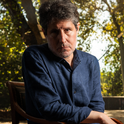Ever since Edgar Allan Poe laid the foundations of horror and detective fiction in the 1830s—and was soundly reviled for this impertinence in his native land—genre and literary authors have been wary of one another. The history of high literature is also the history of genius; of the Shakespeares and Byrons whose unique talents have bewildered the world. Throughout genre fiction's briefer lifetime, however—from Poe to le Carré via Verne—the contract between audience and author has always been the most important matter. This is what genre signifies: you aim to please them at least as much as yourself, and you aim to sell. In a history thick with pulps and penny dreadfuls, no area of fiction has been more thoroughly commercial in its instincts than genre fiction; and when audience is the bottom line, this means sales. The number one slot on the New York Times's bestseller list is to a genre writer what the National Book award is to a literary novelist: a badge of ultimate respectability. Literary books sometimes sell well, of course (though not as well as genre works), and praise is sporadically wafted from the ivory towers towards deserving outsiders (though never as fulsomely as upon literary insiders). But little love lost is lost on either side. Highbrows envy lowbrows' sales; lowbrows envy the accolades of the establishment, and its guardianship of posterity.
At a time of increasing fluidity in all areas of the arts, it is astonishing how clear this basic divide remains. Authors with incomes and sales beyond the wildest dreams of Nobel laureates continue to pine for a mention in the Times Literary Supplement. Professors of poetry with shelves of awards lie awake at night hoping that attendance at their next reading will hit double figures. As Jilly Cooper pithily put it, "Jeffrey Archer and I cry and cry for a kind word in the Guardian, and writers that get a kind word in the Guardian… cry and cry for our sales." This is the result in part of a fracture in the way we are taught to read, and in part of the startling moral weight that continues to be attached to the choices we make as readers.
The satisfactions of genre fiction are both mundane and atavistic. It combines the comfortable pleasure of conventions with the tides of conspiracy, horror, sex, violence and wonder that genre's restraints allow authors to channel. Unlike "proper" literature, with its emphasis on originality and authenticity, the best genre fiction is both vicarious and predictable: it offers a subtle refinement of known thrills. As far as many of our educators are concerned, this makes genre writing not just bad literature but "bad" literature—something that drags us away from clear thought into a wickedly fantastical realm. It was in something like this spirit that FR Leavis preached his "great tradition" to the 20th century. The act of reading was to be a substitute for religion, making the best minds of a generation better and the worse somewhat less bad—and the discipline of literature was to be rescued from the accusations of unseriousness that had dogged it since it began to be taught at universities at the start of the 20th century. Words, for Leavis, were a battleground upon which the souls of readers were won and lost. Something like this attitude persists even in the realm of 21st-century letters.

Except that genre fiction is difficult to do right, and Benjamin Black is the author of two decent but, to my mind, unsatisfying novels. The plots are meticulous, the language is expertly managed, yet the results are somehow less than thrilling—mannered where they should be moody; introspective where they should be pacy. There is little of the obsessional energy that motors beneath the surface of novels by Tom Clancy, John Grisham and Ian Rankin; there is no sense that our author is ever less than entirely in control. The books are, in other words, insufficiently generic.
Banville is, of course, to be commended for reaching out towards a wider audience. But how often is a genre author commended for reaching out towards a more discerning one? When Stephen King—whose non-fictional work On Writing (2000) is one of the most eloquent and widely read incitements to literature to have appeared in English in the last 50 years—was honoured in 2003 with a Medal of Distinguished Contribution to American Letters, choruses of disapproval sounded on both sides of the Atlantic. Harold Bloom called it "another low in the shocking process of dumbing down our cultural life"; Richard Snyder, former chief executive of Simon & Schuster, remarked: "[King] sells a lot of books. But is it literature? No."
Yet, if the US is starting to label authors like King "distinguished," the tide may at last be turning; and this can only be a good thing for books. As King himself argued in a recent essay for the New York Times, no literature can survive in too rarefied an air, while talent has always been something that "roars along in fair weather or foul, not sparing the fireworks"—it can't be canned and labelled. Genre, in other words, is one of the great pleasures and enablers of literature.










